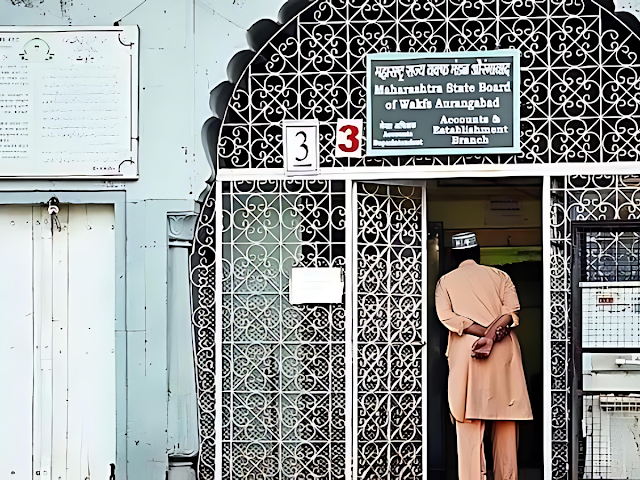By Firoz Bakht Ahmed*
Amidst ongoing controversy regarding the Government of India's initiative to introduce legislation aimed at "regulating" Waqf properties through digitization, it remains evident that there is a troubling history of mismanagement and exploitation of Waqf lands.
These properties, donated by affluent individuals for the welfare of orphans, widows, divorcees, and for educational and charitable causes, encompass approximately 500,000 registered properties and around 900,000 acres of land, making them the largest in the world.
Indeed, as reported by a parliamentary committee led by K. Rehman Khan, Waqf properties rank as the third-largest landholding in India, following the Indian Railways and the defense department.
Alarmingly, Khan’s report highlights that nearly 70% of Waqf land has been encroached upon, with widespread corruption evident in the practice of leasing land to developers, markets, hotels, and industries at shockingly low rates.
The foundation of Waqf is deeply rooted in Quranic teachings regarding charity, as articulated in verses that emphasize the obligation to share wealth with the needy. Scholars like Imam Abu Hanifa have defined Waqf as a means to allocate specific assets in the name of Allah, with the profits directed toward charitable purposes. This system has evolved into a significant institution within Islamic law, intertwining religious obligations with social welfare for the Muslim community.
Waqf essentially refers to the endowment of property—both movable and immovable—by Muslims for the benefit of those in need, as well as for maintaining religious sites such as mosques and shrines. The individual establishing the Waqf, known as the Waqif, designates a Mutawalli (manager or caretaker) to oversee its management.
Historically, various laws have governed Waqf operations, including the Central Waqf Act of 1954 and its amendments. M. Atyab Siddiqui, a lawyer specializing in Waqf law, points out that for over a millennium, property has been dedicated to charitable purposes in the name of Allah.
Yet, the list of individuals implicated in the encroachment and corruption surrounding Waqf properties features numerous prominent figures. The intention behind these endowments was to generate income for the support of orphans, widows, and various social causes. However, Waqf Boards have often failed to fulfill their responsibilities.
According to Siddiqui, significant revenue could be generated if even the remaining unencroached properties were effectively leased. He reveals that legal hurdles persist, with reports of missing files and Waqf Board lawyers being compromised by encroachers.
Evidence of the Waqf Board’s corruption is highlighted by cases such as the Maharashtra Waqf Board leasing a prime plot of land at a mere fraction of its market value to Mukesh Ambani for his lavish residence. With over 60% of Waqf land currently encroached upon, there are further examples in cities like Bangalore, where the Windsor Manor Hotel, valued at over Rs 1,000 crore, has been leased out for just Rs 12,000 per month.
Reports also indicate that many Waqf managers view their properties as personal assets, using historical sites like the Anglo Arabic School in Delhi for commercial gain. Despite the high court ordering the removal of encroachers, attempts to reclaim these sites have been ongoing, yet they continue to face new encroachments.
The list of individuals implicated in the encroachment and corruption surrounding Waqf properties features numerous prominent figures
Kamal Farouqui, a prominent Muslim thinker, criticizes the "abhorrent nexus" of politicians, police, bureaucrats, and land mafias targeting Waqf properties, which are often located in prime locations.
Despite laws prohibiting the sale or reallocation of Waqf land, there continue to be systematic violations with little accountability for those involved. Typically, developers identify a Waqf property and discreetly negotiate with board members, resulting in properties being sold at undervalued prices while board members profit from the transactions.
This lack of accountability for irregular dealings within Waqf Boards exacerbates the issue. Despite owning an extensive portfolio of properties, many Indian Muslims remain among the nation’s poorest, according to Sirajuddin Qureshi, an esteemed community leader. Meanwhile, social workers like Iqbal Mohammad Malak continue to highlight the ongoing exploitation of Waqf assets for personal gain.
The widespread apathy within the Muslim community toward corruption in Waqf management is concerning. Despite repeated media exposure of misconduct by Mutawallis and others managing Waqf assets, tangible action remains elusive. Theologically, once properties are dedicated to Waqf, they are meant to remain perpetual and inalienable.
Historically, oversight of Waqf properties has shifted from the absence of central management during Muslim rule to provincial control in British India, ultimately leading to the establishment of the Central Waqf Council post-independence. However, allegations of corruption within this body persist, as demonstrated by inquiries into financial misconduct.
To address these issues, there is need to restructure Waqf management, incorporating transparent and responsible committees focusing on various welfare areas, such as education and health. It is crucial for the Muslim community to advocate for governmental assistance in reclaiming encroached properties and seek a comprehensive overhaul of the existing Waqf system.
---
*Activist, social commentator, and former chancellor


Comments